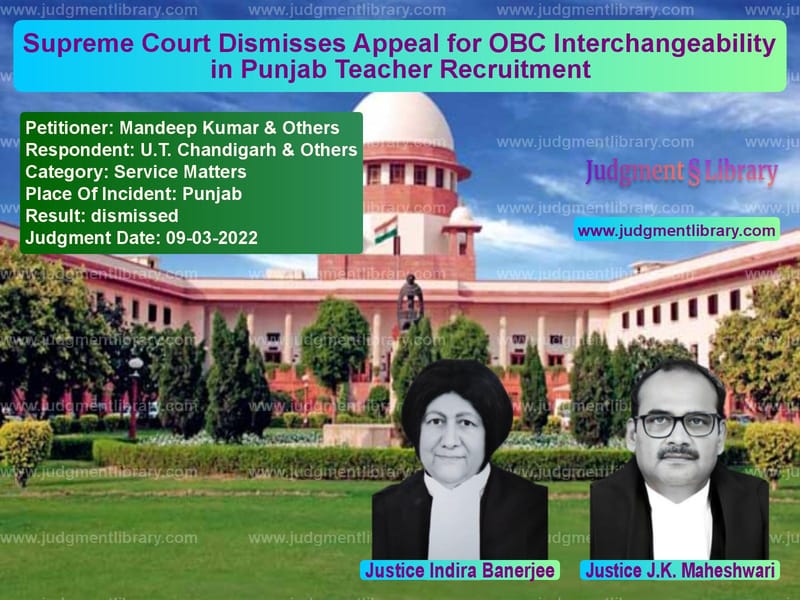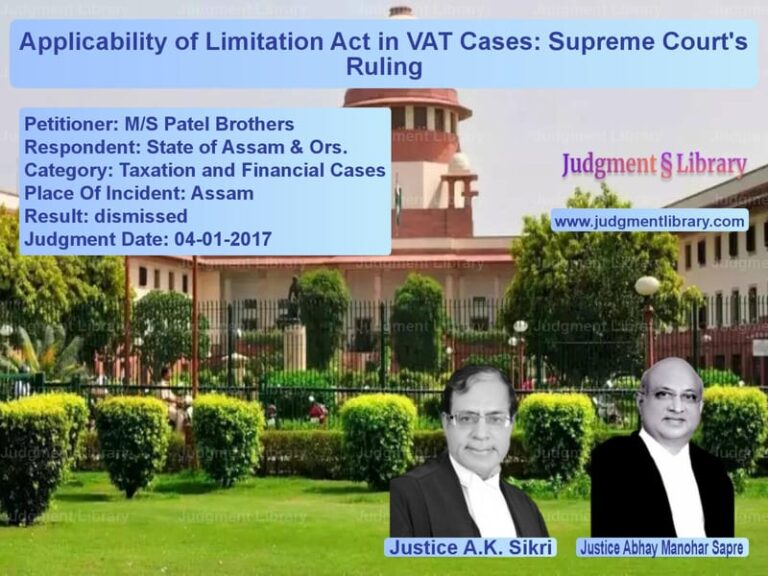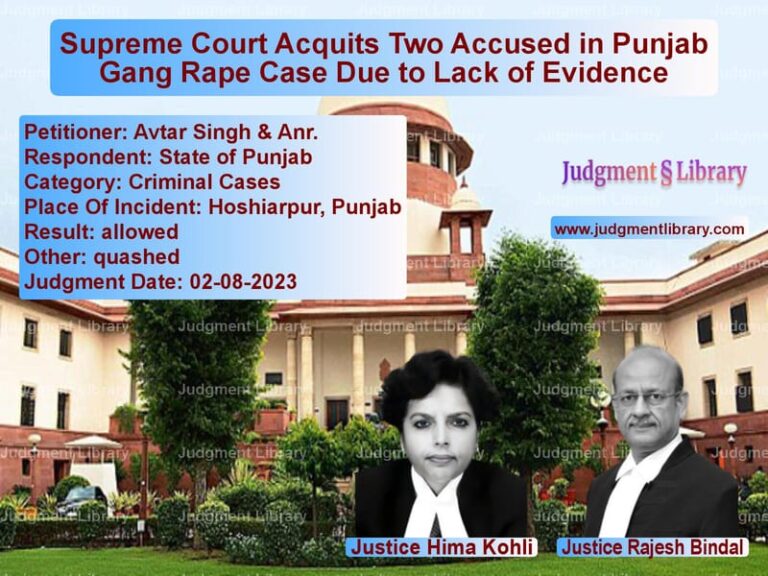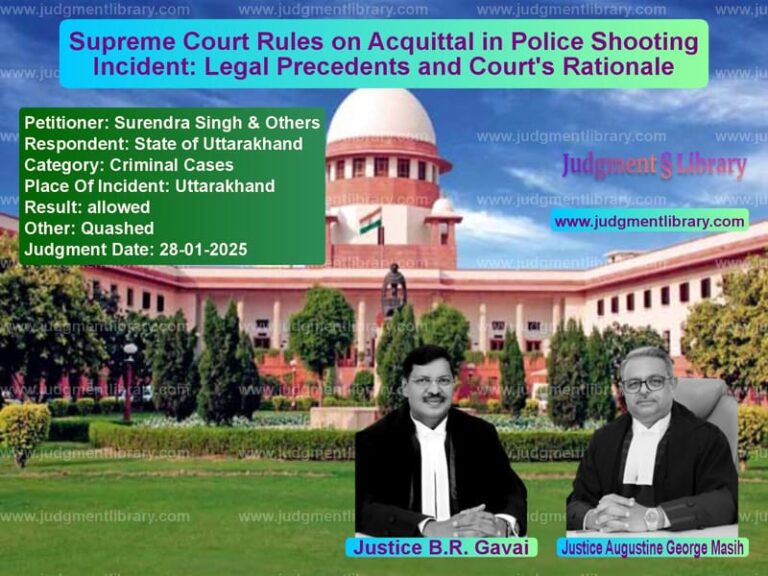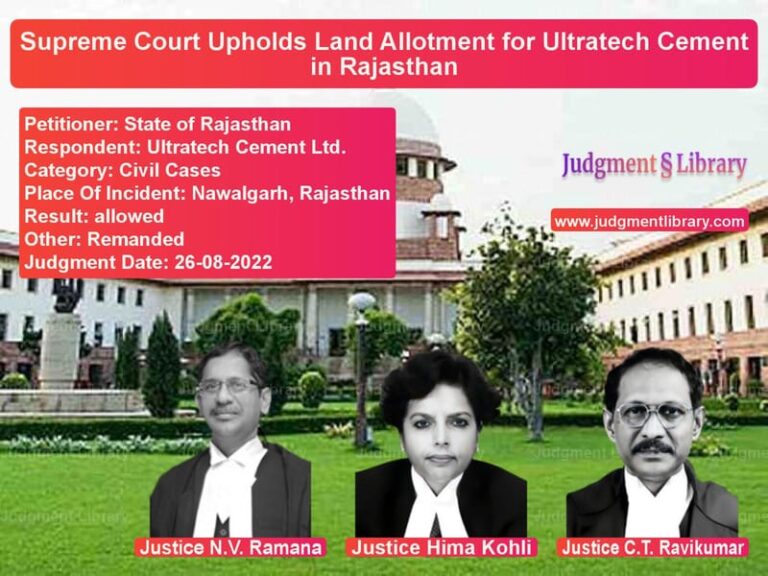Supreme Court Dismisses Appeal for OBC Interchangeability in Punjab Teacher Recruitment
The Supreme Court of India, in its judgment dated March 9, 2022, ruled on the case of Mandeep Kumar & Others vs. U.T. Chandigarh & Others. The case involved a dispute over the interchangeability of reserved teaching posts between the Scheduled Castes (SC/ST) and Other Backward Classes (OBC) categories in Punjab’s Elementary Teacher Training (ETT) recruitment process. The Court dismissed the appeal, affirming that such interchangeability was not permissible under the Punjab Scheduled Castes and Backward Classes (Reservation in Service) Act, 2006.
Background of the Case
The case originated from Punjab’s recruitment of Elementary Trained Teachers (ETT), where vacancies were advertised on November 8, 2015, and July 30, 2016. A total of 6505 vacancies were notified under various categories, including SC/ST, OBC, and others. Due to a lack of eligible candidates in the SC/ST category, 595 posts remained unfilled.
The appellants, who belonged to the OBC category, sought appointment to these unfilled SC/ST category posts under a policy of interchangeability of reserved vacancies. They argued that the posts should be offered to eligible OBC candidates before being re-advertised for general recruitment. Their request was denied by the Punjab government, leading to legal proceedings.
Petitioner’s Arguments (Mandeep Kumar & Others)
The appellants contended:
- Interchangeability between SC/ST and OBC posts was allowed under the Punjab Government’s 1954 Policy Letter No. 17246.
- The Punjab Scheduled Castes and Backward Classes (Reservation in Service) Act, 2006, did not explicitly prohibit such interchangeability.
- The government’s decision to re-advertise the posts instead of filling them with OBC candidates violated principles of equality and wasted available talent.
- They had already qualified the selection process and should be appointed in place of unfilled SC/ST vacancies.
Respondent’s Arguments (U.T. Chandigarh & Others)
The respondents argued:
- Under Section 7 of the 2006 Act, de-reservation of SC/ST vacancies was not permissible by the appointing authority.
- De-reservation required approval from the Department of Welfare of Scheduled Castes and Backward Classes, which had denied the request.
- The 1954 Policy Letter No. 17246 had been withdrawn in 1964 and only partially restored in 1974 under limited conditions.
- Re-advertising the posts was the only lawful course of action as per the High Court’s prior ruling.
Supreme Court’s Observations
The Supreme Court, comprising Justices Indira Banerjee and J.K. Maheshwari, ruled in favor of the respondents and dismissed the appeal.
On Interchangeability of Reserved Posts
The Court stated:
“The provisions of Section 7 of the 2006 Act clearly restrict de-reservation of reserved vacancies by the appointing authority. Any such de-reservation requires approval from the Department of Welfare of Scheduled Castes and Backward Classes.”
On the 1954 Policy Letter
The Court held:
“While Policy Letter No. 17246 allowed interchangeability, it was withdrawn in 1964 and later modified in 1974. However, it does not override statutory provisions of the 2006 Act.”
On the High Court’s Prior Decision
The Court observed:
“The High Court had already considered the issue and directed the government to proceed with recruitment in accordance with law. The government’s decision to re-advertise the posts is legally sound.”
On the Merit of the Appellants
The Court ruled:
“The mere qualification of the candidates does not entitle them to appointment in a category where vacancies remain unfilled due to lack of eligible candidates. The recruitment process must follow the prescribed legal framework.”
Final Verdict
The Supreme Court ruled:
- The appeal is dismissed.
- The request for interchangeability of SC/ST vacancies with OBC candidates is rejected.
- The Punjab government is permitted to re-advertise the posts as per law.
- No additional relief is granted to the appellants.
Implications of the Judgment
This ruling establishes several key legal principles:
- Reserved category vacancies cannot be freely interchanged without explicit statutory backing.
- De-reservation must be approved by the relevant government department, not by appointing authorities.
- Past policies do not override current statutory provisions.
- Appointments must be made strictly as per recruitment rules, even if vacancies remain unfilled.
Conclusion
The Supreme Court’s ruling in Mandeep Kumar vs. U.T. Chandigarh reinforces the principle that recruitment must be conducted within the framework of the law. It upholds the statutory requirement that SC/ST vacancies cannot be interchanged with OBC candidates without explicit government approval. The judgment ensures that reservations are implemented as per legal mandates, preventing unauthorized alterations to category-wise recruitment.
Petitioner Name: Mandeep Kumar & Others.Respondent Name: U.T. Chandigarh & Others.Judgment By: Justice Indira Banerjee, Justice J.K. Maheshwari.Place Of Incident: Punjab.Judgment Date: 09-03-2022.
Don’t miss out on the full details! Download the complete judgment in PDF format below and gain valuable insights instantly!
Download Judgment: mandeep-kumar-&-othe-vs-u.t.-chandigarh-&-ot-supreme-court-of-india-judgment-dated-09-03-2022.pdf
Directly Download Judgment: Directly download this Judgment
See all petitions in Recruitment Policies
See all petitions in Public Sector Employees
See all petitions in Judgment by Indira Banerjee
See all petitions in Judgment by J.K. Maheshwari
See all petitions in dismissed
See all petitions in supreme court of India judgments March 2022
See all petitions in 2022 judgments
See all posts in Service Matters Category
See all allowed petitions in Service Matters Category
See all Dismissed petitions in Service Matters Category
See all partially allowed petitions in Service Matters Category

